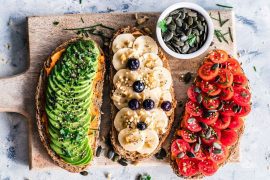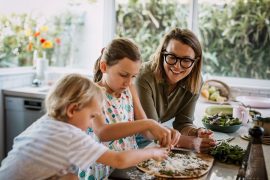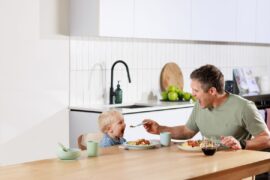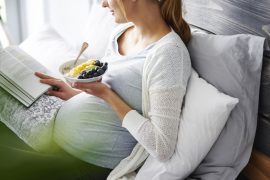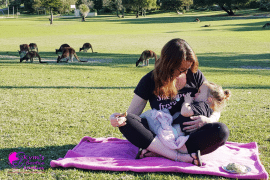After making lunch boxes for 10 years (where did that time go) – I know!
And now as they’ve gotten older and their peers are so much more influential in their choices, it’s harder again.
It’s one thing to know what makes a good nutritious lunch box, another getting kids to eat it, especially when their buddies are opening up packets of “food” and munching on vegemite sandwiches, and “no-one wants to swap their lunch with you!” OR they just won’t eat the healthy “stuff” and are fussy eaters. It’s easy to relent. But that’s like saying to them it’s OK, and it’s not. Every now and again is OK – not most of the time.
Which is WHY as parents and carers, it’s important to stay strong in encouraging our children to eat well in their early years.
I think of it as my gift to them and that one day they’re going to be grateful for all those “weird” foods in their lunch boxes (fingers crossed).
In saying that, an unhealthy lunch box is not about lazy, un-financial or ill-informed parenting.
It’s a symptom…
It’s a symptom of deeper issues at play:
- After a while kids will crave simple carbohydrates and sweet foods, usually found in packets laden with additives and refined sugars.
- Kids palates and microbiome changes making it more likely for them to make the unhealthier choice and refuse their veggies or meat.
- When children are deficient in key nutrients for example, the texture of some foods is physically very hard for them to tolerate and yet they’re labelled as “fussy eaters”.
- Life is full. We feel we have little time to prepare healthy lunch boxes.
- It’s hard to know what truly is healthy for our kids and what’s not?
- A healthy lunch box isn’t always seen as a priority in society.
- Packet food for breakfast and lunch boxes is big business. And their marketing campaigns are hard to ignore and don’t have our wellbeing in their best interest.
- As parents, carers, teachers and leaders we are not being taught or shown what healthy is. Traditionally this knowledge was originally passed down from one generation to the next – and we learnt it all before the “a-pill-for-an-ill” mentality took over. As women and men moved from the home (farm) into the workforce and convenience foods became a “saviour”, this fundamental knowledge has been lost.
- Generally, eating good, nutrient-rich food isn’t seen as a priority or a necessity.
Making time for preparing good food now is better than making time for sick kids, doctors, specialists, medication and the slippery slope into autoimmunity and chronic illness later.
Perhaps by bringing awareness to these deeper issues / thoughts it will make it easier next time you’re preparing lunch boxes in the heat of the busy morning.
And if your children refuse to eat your healthy lunch box, don’t give up, there is a good reason for it. Rather find someone you know who understands the deeper issues or contact me for a complementary initial discussion to hear more about how we will get them enjoying a wide variety of foods and so much more.
It’s a complex issue. Strong social leaders like chef Pete Evans and also Sarah Wilson (I Quit Sugar), with massive international audiences, have tried to change what “healthy” looks like in our schools at a government level, with only limited success.
But is it totally up to the government? Of course not – we need to be aware of the deeper issues and take responsibility ourselves.
It starts in our homes, at our tables and in our hearts.
Think about real food – clean, natural, real…
Let’s bring back healthy lunches.
And for simple ideas on how to save time and pack a healthy lunch box, with loads of nourishing, delicious recipes, a reminder to check out my Lunch Box Rescue ebook.
Originally published HERE.
After working as an executive in professional services, Kate Barnes started her global business as a Certified Holistic Health Coach. She has a Bachelor of Science and a Post Graduate Diploma in Business. Kate runs an online program, ‘Our Happy Children‘, a leading education program for deeply nourishing families and building strong immunity, great energy and preventing illness. For more information visit Kate’s website, like her Facebook page for loads of daily inspiration, healthy tips and more recipes and follow her on Instagram: @kate_barnes_health_coaching.

